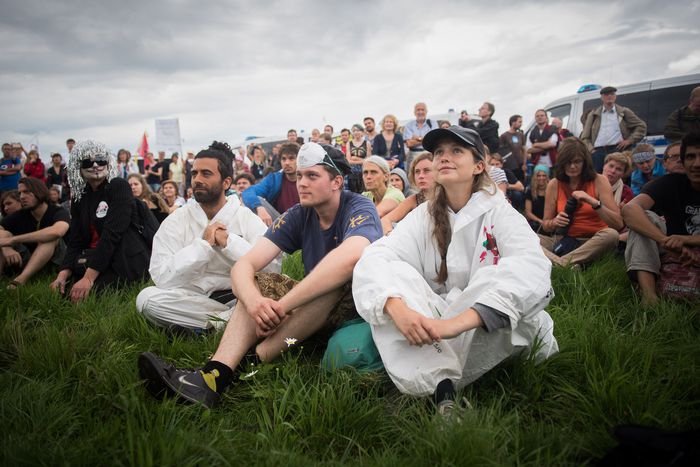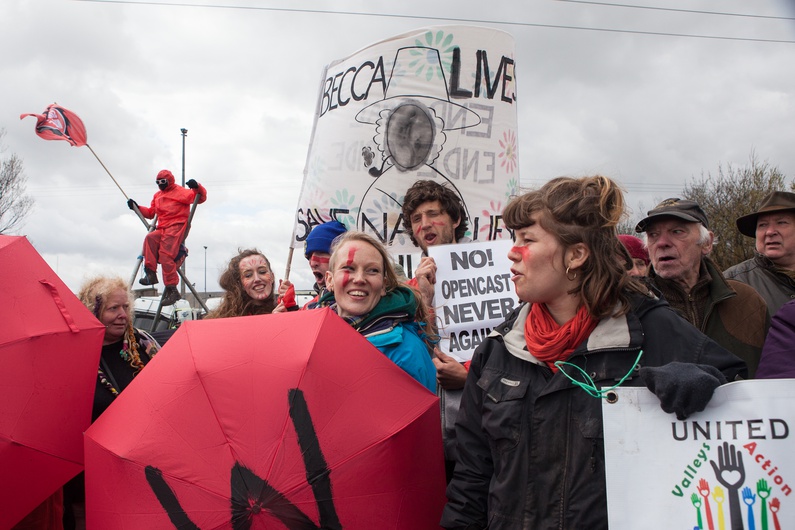
Fossil fuels: Young climate activists want to "Break Free"
Published on
In conference rooms around the world, greying diplomats and academics are asking: "How do we get young people involved in climate change?" Yet if we take a look outside of the conference rooms, it's easy to see that young people are already taking action. The Break Free campaign, which organises demonstrations aimed at keeping fossil fuels in the ground, is a prime example.
The Break Free campaign, which ended on the 15th of May, is evidence that young people are demanding change when it comes to climate action. In Europe, a coal mine in Wales was brought to a standstill for a full day. In Ende Gelände, Germany, young people also came in great numbers to a protest that shut down a lignite mine for two consecutive days.
Activism without borders
Hannah Eichberger, one of the organisers of the Ende Gelände protest, describes it as a "nationwide coalition, supported by international activists from mainly European countries". This international support is far from anecdotal: at least 20 buses brought protesters across borders to the event, carrying approximately 1,000 people.
Beyond mere numbers, protests are being reshaped and revitalised by this international dimension. Annie, a student in the UK who made the trip to Germany told us that she heard of Break Free via word of mouth, when she travelled to Paris for COP21 last year.
Eichberger recalls taking part in the 2009 protests around the COP summit in Copenhagen, and says that it's common for German activists to support and attend protests abroad, such as the Climate Games. She describes these experiences as "empowering" going on to say that "activists feel that they are part of a global struggle against climate change".
The international solidarity emerging from the latest protests plays an important part in inspiring young people today to engage in climate activism. Going international is also a golden opportunity for protests to increase their impact. Eichberger explains: "International mobilisation is a great support, because the action has a huge outreach, even in advance. And of course, it helps to get international media attention for local climate crimes."
The challenge now lies in coordinating these efforts, so that they can respond to both local and international needs. Eichberger acknowledges that this is a work in progress: "In international coalitions, needs, wordings and work structures are different depending on the specific local struggles. It takes time to understand these different needs and to set up global communication structures. I learned a lot about different realities activists face in their local contexts."
From the bottom up
Coordinating the new wave of climate protests in Europe is also made challenging by the aspirations of many of the young people taking part in these protests, who do not conceive themselves as part of a homogeneous movement. In fact, they claim their diversity is a strength. Many, like Annie, do not want to be tied to any specific organisation.
Annie explains that it's about offering "a break in the status-quo and an alternative". This alternative explicitly rejects a top-down hierarchy with centralised authority, and instead adopts the participatory approach: "Rather than trying to create a unified body, a central theme becomes diversity and the celebration of difference. Similarly, rather than conflict being destructive, it's thought it can be constructive."
 These ideas are once again revealing of the strong ties between the Break Free campaign and the wider international context of protest, which has seen the rise of movements working to create new ways of doing politics, such as Nuit Debout, the Indignados movement, or the Occupy movement.
These ideas are once again revealing of the strong ties between the Break Free campaign and the wider international context of protest, which has seen the rise of movements working to create new ways of doing politics, such as Nuit Debout, the Indignados movement, or the Occupy movement.
Mathieu Munsch, a student who took part in the Break Free action in Wales, answers to those who would scoff and call such young protesters idealistic: "I know, dreaming of a global civil uprising against corporate greed may sound incredibly utopian to some. But the pragmatic path that’s decided for us leads us to the stuff of nightmares."
This alternative approach to making change could explain why today's leaders are having so much difficulty reaching out to the youth. When they ask, "Where are the young people?" perhaps they are simply looking in the wrong place. Had they extended their gaze beyond the conference rooms, out to the lignite mine of Ende Gelände, they would have found them.



